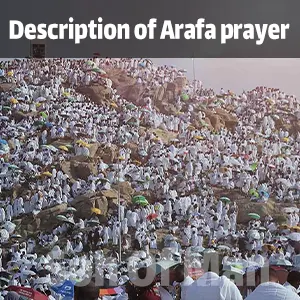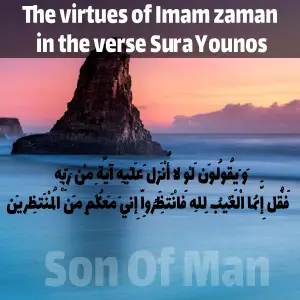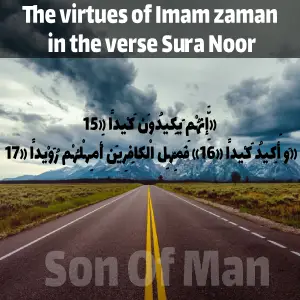Description of Arafa prayer
Description of Arafa prayer

Description of Arafa prayer
The Arafa (the day before the festival of sacrifices in Hajj) prayer was read at the 9th day of Zelhajje, probably year 59 and in Arafat desert.
First part
What day is Arafa?
The 9th day of Zelhajje (one day before Eid al-Adha) which according to the Shia religious jurisprudence Hajj pilgrims should stay in Arafat from noon to evening. For superiority of this day this is enough that it is narrated from a chaste that anyone in the month of fasting did not include in forgiving of God, do have hope in Arafa. ” مَن لَم یُغفَر لَهُ فی شَهر رمضان، لَم یُغفَر لَهُ الی قابِلٍ الّا ان یَشهَدَ عَرَفَه”. The appellation of this day is staying in Arafat desert that anyone being in any place (of the desert) is in Arafa and Arafat is the name of whole area. The significance of this day is that it is actually the beginning day of Hajj rituals. Hajj pilgrims gather together in Arafat desert and in addition to pray and asking forgiveness, they are thankful of great God for doing the very important Hajj rituals. With regarding this importance, the Imams (AS) has read different prayers in this day which their most known one is Imam Hussain and Imam Sajjad (AS)’s Arafa prayer. Sheikh Sadough in ‘’ Adiat_ol_moughef’’ has collected the prayers read by Imams. Imam Bagher (AS) has said:’’Arafa day is the day of pray and requisition from God.’’ To this reason, although praying and fasting are both recommendable, but the only case in narratives which the prayer is preferable is prayer in Arafa day.
At the other hand the martyrdom of Moslem_ibn_ a ghil cousin and ambassador of Imam Hussain (AS) and also (martyrdom) of Haani_ibn_Orva Mazhaji who was one of the Imam Hussain (AS)’s Shias in Kufa is in this day.
Description of Arafa prayer
Second part
Introducing Arafa prayer:
Imam Hussain (AS)’s Arafa prayer is one of the prayers which Shias read in 9th day of Zelhajje, called Arafa day, in Arafat desert or other places. One of the common mistakes is this conception that prayer was read in 61th year which is void because in the Hajj before Ashura Imam Hussain turned the rituals in the 7th day into Umrah and left it half-finished and did not stay in Arafat (desert). Sheikh Hussain Ansarian wrote that some people know the evidence of prayer related to the year before it. Narratives say that in last hours of Arafa (day) Imam Hussain (AS) with some relatives come out from the tent and stood with complete humility and modesty at the left side of the mountain toward the Kaaba and began to read the prayer. Sheikh Hussain Ansarian believes that if someone can realize the deep propounded issues in this prayer, will be a complete believer from the stand point of
Deed and cognition.
The document of the prayer:
In going-over of the documents of narrations there are three ways: The first is with narrative’s reliability and originality and honesty and the other one is with highness of content and exactitude of text and sometimes with proofs and detached and connected evidences. Therefore, the documentation going-over of the Hadiths and narrations does not have topicality but has credo.
Arafa prayer was narrated by two brothers named Boshr and Bashir the sons of Ghaleb Asadi which ayatollah Khoi knows Boshr as one of the Imam Hussain and Imam Sajjad (AS)’s Sahaba and Bashir the narrative of Imam Hussain (AS).
Alame (a title for great scholars) Sharai has knew Bashir as having eloquence and fluency in speech and the narrative of the Zeynab (s) known oration in Kufa and Imam Sajjad also introduced him. But some scholars are not certain about the document of the adoration; of course, according to the grandeur of content know it self-contained from document.
Description of Arafa prayer
Third part
The document of Arafa prayer:
The Arafa prayer has two parts. The first part is common among narratives but there is disagreement about the second part.
Seyed_ibn_tavos (7th century) in Mesbah_o_zaer and Eghbal_ol_aamal, kafaami (9th century) in Albalad_ol_amin, and after these two Majlesi (11th century) in Behar_ol_anvar and Zad_ol_maaa’d and Sheikh Abas Ghomi in Mafatih_ol_jenan had narrated this prayer.
But the last part was narrated by Seyed_ibn_tavos in his other book, Eghbal_ol_aamal; of course in some copies of this book also it has not been narrated. Majlesi, although, has doubted about the issuance of this part from Imam Hussain (AS) and considered probable that this part has joined (to the book) later by some Sheikhs of Sofia.
Jalal_e_din Hamaai in the foot note of the Molavi-naame’s introduction had imputed this part of the prayer to Ataa_o_Allah Eskandaraani Shazli Taaj_o_din Abolfazl Ahmad_ibn_Mohammad Soufi the well-known gnostic of 7th century and states the old version of ‘’Alhokm_o_ataaie’’ as his proof and gnostic Tehraani insists (on that) in abstract soul.
Ayatollah Shobairi Zanjaani also states that (this) part later has been joined (to the prayer).
But Ayatollah Javaadi Aamoli believes that Seyed_ibn_tavos in Eghbal_ol_aamal has narrated that although it has not been written in some hand-written copies due to profession to amnesia of some copywriters but gnostic Sharaani has stated that it was written in an old version (of the book) in holy court. At the other hand the high content of the prayer is the evidence of issuance by Imam (AS). The first part has a general content but the king of Arafa prayer’s issues and the pick of its learnings, is the final part of the prayer which has content similarity with other speeches of Imam (Hussain AS).
Description of Arafa prayer
4TH PART
Imam Hussain’s adoration in the day of Arafa:
I think adoration is a kind of conversation between the person who prays with the listener of the pray. I believe to this conversation in the word of God as well. Several یا ایها الذین آمنوا ( oh! The believer ones) in Quran is the lovely addresses of God and Lords and my Lords also teaches the worshipers how to talk with the worshiped.
At the beginning the addresser of the conversation has been introduced. At first Imam Hussain (AS) states some features of the grace and glory of God. This is interesting that the first (stated) name of God’s names is سمیع (Samii: very auditor). After that the relation between the two sides of the conversation has been determined. It has been professed (by Imam) to the divinity of God. Then implication to the way of human’s birth and growing. At the birth stage knows not to born among the unbelievers the first kindness and favor and benefaction from God and continues with the explanation of the way of creation the favor and benefaction from God to him that even his ignorance and impudence did not prohibited the implication of guidance to his closeness to God.
لَمْ يَمْنَعْكَ جَهْلى وَجُرْاءَتى عَلَيْكَ اَنْ دَلَلْتَنى اِلى ما يُقَرِّبُنى اِلَيْكَ
Then Imam Hussain states:
فَاِنْ دَعَوْتُكَ اَجَبْتَنى وَاِنْ سَئَلْتُكَ اَعْطَيْتَنى وَاِنْ اَطَعْتُكَ شَكَرْتَنى وَاِنْ شَكَرْتُكَ زِدْتَنى، کُلُّ ذلِكَ اِكْمالٌ لاَنْعُمِكَ عَلَىَّ وَاِحْسانِكَ اِلَىَّ
If I call you, you would comply me, if I ask you, you would grant me, if I obey you, you would appreciate me and if I praise you, you would add to my blessing and all of these are the completion of your blessings to me and your benefaction toward me.
Hereafter Imam Hussain (As) with purifying God with the phrase””فسبحانک سبحانک )then you are pure, you are pure…) begins to name blessings of God.
Description of Arafa prayer
5th Part
Remembering the blessings of God in Imam Hussain’s Arafa prayer:
Imam Hussain (AS) in remembering the blessings of God has used a daintiness which calls to some witnesses as evidences for his faith that these witnesses are in a way the anatomy of the person who prays’ body to where (he) knows the counting of these God’s blessings out of the counters’ ability with beautiful phrases
وَلوْ حَرَصْتُ اَنـَا وَالْعآدُّونَ مِنْ اَنامِكَ أَنْ نُحْصِىَ مَدى اِنْعامِكَ سالِفِهِ وَ انِفِهِ ما حَصَرْناهُ عَدَداً وَلا اَحْصَيناهُ اَمَداً
And if all counters’ and me greed to count your inveterate and unprecedented blessings no way we can count nor we can determine its amount.
Here adduces to the word of God that وَاِنْ تَعُدُّوا نِعْمَةَ الله لا تُحْصُوها (and if you count it you can not determine it).
After these stages Imam Hussain (AS) begins to request God
First requests:
اَللّهُمَّ اجْعَلْنى اَخْشاكَ كَانّى أَراكَ وَاَسْعِدْنى بِتَقويكَ وَلا تُشْقِنى بِمَعْصِيَتِكَ وَخِرْلى فى قَضآئِكَ وَبارِكْ لى فى قَدَرِكَ حَتّى لا احِبَّ تَعْجيلَ ما اَخَّرْتَ وَلا تَاْخيرَ ما عَجَّلْتَ اَللّهُمَّ اجْعَلْ غِناىَ فى نَفْسى وَالْيَقينَ فى قَلْبى وَالاِخْلاصَ فى عَمَلى وَالنُّورَ فى بَصَرى وَالْبَصيرَةَ فى دينى وَمَتِّعْنى بِجَوارِحى وَاجْعَلْ سَمْعى وَبَصَرى اَلْوارِثَيْنِ مِنّى وَانْصُرْنى عَلى مَنْ ظَلَمَنى
Imam Hussain (AS) say: O God! give me such a modesty as if I see you and make me blissful with piety of you and do not make me of villain people by sin and make me acceptor of your fate and put benediction for me in your predestination in a way that not to like what you delay and not to delay what you haste in it. My Lord! Put self containing in my soul and certainty in my heart and sincerity in my deeds and the light in my sight and my sight in my religion and make me prosperous of limbs and make my ear and eyes my heirs and help me in front of someone who oppresses me.
6th part
Remembering blessings of God in Imam Hussain (AS)’s Arafa prayer:
From here the notable phrases begins with ‘’ رب بما…’’ (God (I) administer an oath…):
رَبِّ بِما بَرَاءْتَنْى فَعَدَّلْتَ فِطْرَتى
God! I administer an oath to you created me then you put balance in my creation
This structure of the sentence both is mentioning the blessings of God and has a kind of request hidden in itself which is significant from the literature view.
Hereafter a part of the prayer is interesting. Imam Hussain (AS) requests from God to اِلى غَیْرِکَ فَلا تَکِلْنى.
Do not leave me to someone except yourself. And then asks to whom do you leave me? اِلهى اِلى مَنْ تَکِلُنى؟
And answers: اِلى قَریبٍ فَیَقْطَعُنى اَمْ اِلى بَعیدٍ فَیَتَجَهَّمُنى اَمْ اِلَى الْمُسْتَضْعَفینَ لى وَاَنْتَ رَبّى وَمَلیکُ اَمْرى
To my relatives you leave me to feud me, or to a stranger you leave me to grouch to me, or the ones who disdain me and despite of that you are my God and my ruler.
In other sentences Imam Hussain (AS) changes the kind of phrasing and meanwhile stating the features of God, tells his request یا مَنْ عَفا عَنْ عَظیمِ الذُّنُوبِ بِحِلْمِهِ
Oh! The forgiver with tolerance of sins.
With this introduction in fact requests him to forgive his big sins.
Imam Hussain (AS) continues with the phrase ‘’ اَنْتَ کَهْفى حینَ تُعْیینِى الْمَذاهِبُ فى سَعَتِها وَتَضیقُ بِىَ الاَرْضُ بِرُحْبِها (you are my refuge when all paths with all their width make me helpless and the Earth with all its width gets hard for me.) points out to his (God) absence and its effects.
وَلَوْلا رَحْمَتُکَ لَکُنْتُ مِنَ الْهالِکینَ وَاَنْتَ مُقیلُ عَثْرَتى
And if there were not your mercy I would be from perished people any moment; and you are disregarder of my errors.
Description of Arafa prayer
7th part
Remembering the blessings of God in Imam Hussain’s Arafa prayer:
Imam Hussain (AS) by pointing to fault covering, helping of God, introduces some other features of God to where he (Imam) confesses that no one except he(God) cannot say from him(God).
یا مَنْ لا یَعْلَمُ کَیْفَ هُوَ اِلاّ هُو
یا مَنْ لا یَعْلَمُ ما هُوَ اِلاّ هُوَ
یا مَنْ لا یَعْلَمُهُ اِلاّ هُوَ:
Oh! The one who someone except him does not know how he is
Oh! The one who someone except him does not know what he is.
Oh! The one who someone except him does not know him.
Then Imam Hussain (AS) again remembers the help of God to Human being and his ancestors as Sami prophets. He continues with pointing out to what he (God) had bestowed to him and states them to where frankly knows all of them from him.
اَنْتَ الَّذى مَنَنْتَ اَنْتَ الَّذى اَنْعَمْتَ
You are the one who granted, you are the one who gave blessing…
To where he says: تَبارَکْتَ وَتَعالَیْتَ فَلَکَ الْحَمْدُ دآئِماً وَلَکَ الشُّکْرُ واصِباً اَبَداً
Permanent grandeur and superiority, praise and gratitude are for you.
Now after describing the beloved is the lover introduction’s turn. This introduction begins with confession.
ثُمَّ اَنـَا یا اِلهىَ الْمُعْتَرِفُ بِذُنُوبى فَاغْفِرْها لی
Then I, oh! My Lord! confess to my sins, so forgive me
And Imam Hussain (AS) with phrases like ‘’ اَنـَا الَّذى اَسَاْتُ ‘’ (I am the one who did sin) begins to introduce himself.
These sentences get complete with wonderful phrase
فَبِأَىِّ شَىْءٍ اَسْتَقْبِلُکَ یا مَوْلاىَ اَبِسَمْعى اَمْ بِبَصَرى اَمْ بِلِسانى اَمْ بِیَدى اَمْ بِرِجْلى اَلـَیْسَ کُلُّها نِعَمَکَ عِندى وَبِکُلِّها عَصَیْتُکَ
And I with which mean face you Oh! My Lord!, with mu ears? With my eyes? With my tongue? With my hands? Or my legs? Are not all of these your blessings by my side? And I did sin with all these.
Then Imam Hussain (AS) points out to the fault covering of God and that if you inform what you know about me to my parents and family and tribe also ‘’ما انظرونی’’ they would not look at me.
Description of Arafa prayer
8th part
Remembering the blessings of God in Imam Hussain’s Arafa prayer:
After showing implore he (Imam) has some sentences according to the Younesie recital that ‘’ لا اِلهَ اِلاّ اَنـْتَ سـُبـْحانـَکَ اِنـّى کـُنـْتُ مـِنَ الظّالِمـیـنَ ‘’
With this recital introduces himself as respectively cruel to his soul, forgive seeker, monotheist, distressed, hopeful, eager, desirous, tahlil (لااله الا الهه) teller, mendicant, tasbih (سبحان الله) teller, takbir (الله اکبر) teller and with some sentences praises God and while praising prays.
اَللَّهُمَّ اِنَّکَ اَقْرَبُ مَنْ دُعِىَ وَاَسْرَعُ مَنْ اَجابَ وَاَکْرَمُ مَنْ عَفى وَاَوْسَعُ مَنْ اَعْطى وَاَسْمَعُ مَنْ سُئِلَ یا رَحمنَ الدُّنْیا وَالاْ خِرَهِ وَرحیمَهُما لَیْسَ کَمِثْلِکَ مَسْئُولٌ وَلا سِواکَ مَاْمُولٌ
Imam Hussain (AS) says: Oh! God! You are the closest one who is being called and the fastest one who responds and the most magnanimous one who forgives and the most extensive one that grants and the most hearer who is being asked Oh! The most compassionate of this world and the other world and the most merciful of both; there is no asked like you and there is no wished except you…
Imam Hussain (AS) in these parts requests his wishes and people with implore and cry while saying amen! accompany him and the phrase below the first part which is stated in all books and statements finishes:
یا اَسْمَعَ السّامِعینَ یا اَبْصَرَ النّاظِرینَ وَیا اَسْرَعَ الْحاسِبینَ وَیا اَرْحَمَ الرّاحِمینَ صَلِّ عَلى مُحَمَّدٍ وَ الِ مُحَمَّدٍ السّادَهِ الْمَیامینِ وَاَسْئَلُکَ اَللّهُمَّ حاجَتِىَ الَّتى اِنْ اَعْطَیْتَنیها لَمْ یَضُرَّنى ما مَنَعْتَنى وَاِنْ مَنَعْتَنیها لَمْ یَنْفَعْنى ما اَعْطَیْتَنى اَسْئَلُکَ فَکاکَ رَقَبَتى مِنَ النّارِ لااِلهَ اِلاّ اَنْتَ وَحْدَکَ لا شَریکَ لَکَ لَکَ الْمُلْکُ وَلَکَ الْحَمْدُ وَاَنْتَ عَلى کُلِّشَىْءٍ قَدیرٌ یا رَبِّ یا رَبِّ
Imam Hussain (AS) says: Oh! The most hearer of hearers, Oh! the most clear-sighted of all and Oh! the fastest account auditor and Oh! The kindest of all peace be upon Mohammad (PH) and his children the master of all inhabitants of the world and I request from you my wish which if you grant (it) to me it means that its prohibition did not have any harm to me and if you forbid it for me it means its grant to me have had no benefit for me. I request from you to free me the fire of the Hell. There is no God except you, you are unique and there is no associate for you. Real state is for you and praise is for you and you are the one who is capable of everything Oh! God! Oh! God!
Description of Arafa prayer
9th part
The second part in Imam Hussain (AS)’s Arafa prayer:
Hereafter the second part which the doubt in its relation to Imam is more, begins with wonderfully beautiful sentences:
اِلـهى اَنـَا الْفَقیرُ فى غِناىَ فَکَیْفَ لا اَکُونُ فَقیراً فى فَقْرى اِلـهى اَنـَا الْجاهِلُ فى عِلْمى فَکَیْفَ لا اَکُونُ جَهُولاً فى جَهْلى
Imam Hussain (AS) says if I would be rich in my life I am again poor that ‘’هوالغنی” (he (God) is self-contained). So how am I now that in life also I am poor and if I would be scholar in things I am again ignorant that “هوالعلیم” (he is omniscient) so how am I now that I am ignorant in things also and after such a sentence says Oh! God! You are before existence of my disability had introduced yourself with favor and kindness so now you are how when I am disabled and with such trend has very beautiful sentences thatاِلهى وَصَفْتَ نَفْسَکَ بِاللُّطْفِ وَ الرأفَة لى قَبْلَ وُجُودِ ضَعْفى اَفَتَمْنَعُنى مِنْهُما بَعْدَ وُجُودِ ضَعْفى
He (Imam) continues and states some wonderful phrases. The phrases that even makes features of God self-contained and unique from each other and explores his relation among them:
اِلهى تَقَدَّسَ رِضاکَ اَنْ یَکُونَ لَهُ عِلَّهٌ مِنْکَ فَکَیْفَ یَکُونُ لَهُ عِلَّهٌ مِنّى اِلـهى اَنْتَ الْغَنِىُّ بِذاتِکَ اَنْ یَصِلَ اِلَیْکَ النَّفْعُ مِنْکَ فَکَیْفَ لا تَکُونُ غَنِیّاً عَنّی
Oh! God! Your gladness is far above from having reason from you, so how can have any reason from me? Oh! God! You are self-contained of having any benefit of yourself to yourself, so how not to be self-contained from me?
کَیْفَ تَخْفى وَاَنْتَ الظّاهِرُ اَمْ کَیْفَ تَغیبُ وَاَنْتَ الرَّقیبُ الْحاضِرُ اِنَّکَ عَلى کُلِّشَىْءٍ قَدیرٌ وَالْحَمْدُ لله وَحْدَهُ
How you would hide while you are apparent or how you absent yourself while you are observer and present.
Indeed, you are capable of everything
and praise is only for you, Oh! Unique God!
Description of Arafa prayer
Bibliography:
- Imam Hussain (AS)’s Arafa prayer_ explanation and translation of gnostic Abolhasan Sharaani_ correction and introduction of Safar Falahi
- The explanation of Arafa prayer_ Mohammad ali Fazel (Haji Faazel Khorasani) _ as a gift to Jalal_e_din Ashtiani_ Arabic
- Arafa and Arafat_ Seyed Abbas Eslami Kaashaani
- Benediction in Arafat_ Ayatollah Safi Golpayegaani
- Imam Hussain (AS)’s benediction in Arafat desert_ Gnostic Mohammad taghi Jafari
- The explanation of excerpt of Arafa prayer_ Ayatollah Javadi Aamoli
- Mazhar_ol_gharaaeb_ seyed khalaf ibn abd_ol_motaleb
- The explanation of Arafa prayer_ Sheikh Mohammad ali ibn Sheikh Abi taleb Zahedi
- Hedayat_ol_mostabserin (The explanation of Arafa prayer) _ Mirza Ahmad ibn sultan Ali sadr_al_fazael
- The explanation of Arafa prayer_ Seyed Maajed ibn Ibrahim hoseini kashani
- The explanation of Imam Hussain (AS)’s Arafa prayer_ Mohammad Bagher modares bostan abad
- The explanation of Imam Hussain (AS)’s Arafa prayer_ seyed Mohammad taghi Naghavi ghaeni
- The explanation of Arafa prayer_ Mohammad Ali Hazin lahiji
- An exploration in Imam Hussain (AS)’s Arafa prayer_ seyed Alireza seyed kabari
- The pictorial translation of Arafa prayer_ Abd_ol_karim Bi azar shirazi
- Adiat_ol_moghef_ Sheikh Sadogh
Read More
Imam Hussain’s hadith praising God
Imam Hussain about wealth and property
Hadith of Imam Hussain about cheerfulness






